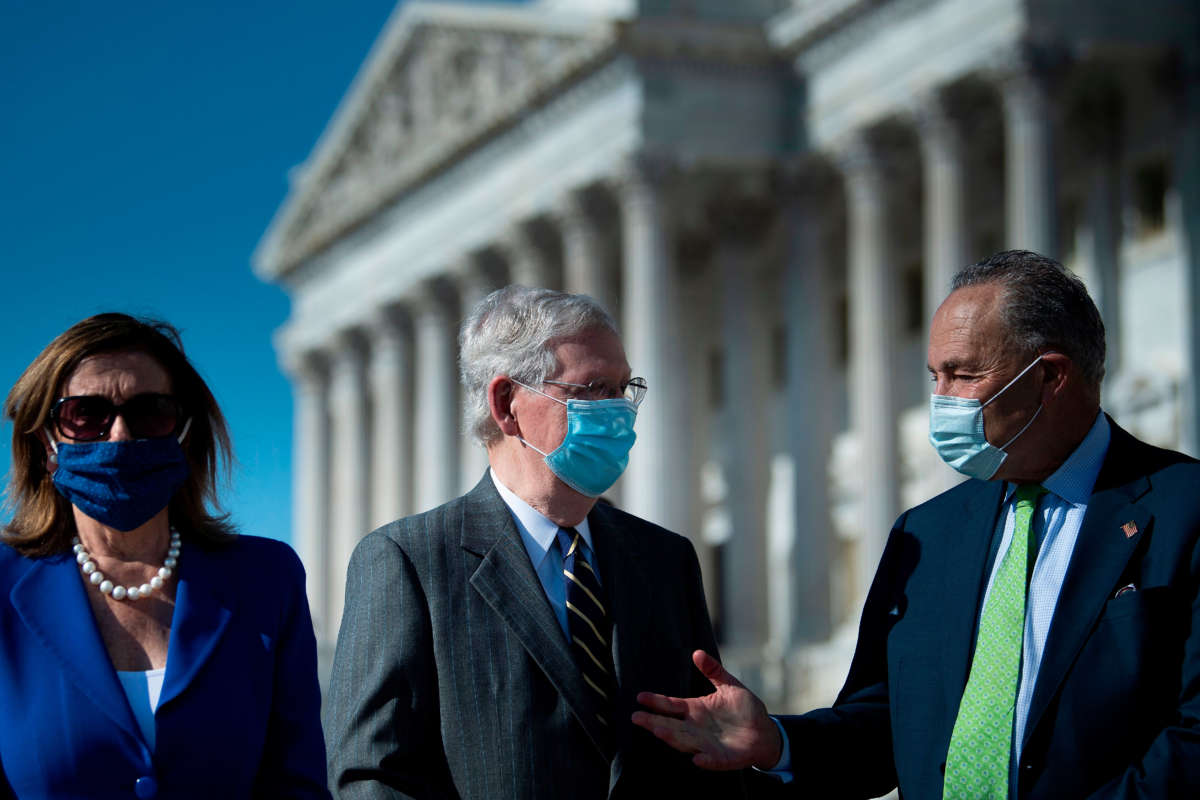Truthout is a vital news source and a living history of political struggle. If you think our work is valuable, support us with a donation of any size.
The 2020 election, like the 2016 presidential race, was supposed to be a landslide victory for Democrats. Instead, Democrats lost a net dozen House seats and barely eked out victories in Congress and the White House, and a new analysis that’s been circulating around Democratic strategists, per The Washington Post, may explain why.
A report seen by Truthout by Way to Win on 2020 election strategies for both major parties found that Democrats focused largely on positive ads mentioning GOP members and touting a willingness to work across the aisle. Meanwhile, Republicans focused on attacking Democrats and painting them as extreme. The GOP gained a net 10 seats in the House and performed better than expected overall.
Democrats raised and spent more than Republicans overall, spending six times more than the GOP on positive ads that mentioned the Republicans and three and a half times more on ads about bipartisanship, according to the analysis. They also failed, Way to Win wrote, to talk about issues of concern to voters, like jobs and the economy.
Meanwhile, the GOP spent 10 times more than the Democrats on painting the opposing party as “radical” and “extremist.” Half of all of conservatives’ ads were based on rhetoric, using words like “AOC,” “socialism,” “defund” and “extreme” to describe Democrats, according to the analysis.
The problem isn’t necessarily that voters dislike the left’s ideas. “The analysis suggests that at least part of the problem — in 2020, anyway — was that Democrats failed to rebut those attacks head-on or to effectively make the case that the GOP is genuinely captured by its extremist elements in a way the Democratic Party simply is not,” wrote The Washington Post’s Greg Sargent.
This disparate messaging from the two major parties caused an unintended effect: Democrats ended up legitimizing the Republicans’ attacks on them because they were so insistent on bipartisanship. And, in so doing, Democrats lost a major opportunity to capitalize on the widespread disapproval of then-President Donald Trump, Way to Win concluded.
Early analyses of 2022 and beyond show dimming chances for Democrats to keep hold of the House. Way to Win says that Democrats need to reevaluate their strategies now in order to preempt losses and focus on talking about the extremism of the right.
“We should be painting them as the extreme outlier that they are,” Jenifer Fernandez Ancona, Way to Win vice president, told the Post.
Indeed, Republican state legislators have spent this year filing hundreds of extreme bills aimed at things like suppressing votes or attacking trans rights.
Progressives and some Democrats have grown increasingly frustrated with the Democratic establishment’s obsession with the illusion of bipartisanship with a party seemingly dead set on dismantling democracy. People like Sen. Bernie Sanders (I-Vermont) have warned that, the longer Democrats drag out talks on things like the recent infrastructure bill, the more chance that the party will lose seats in 2022 and beyond.
Republicans, meanwhile, have completely rejected bipartisanship. Their stated goal is to obstruct Democrats at all costs.
A terrifying moment. We appeal for your support.
In the last weeks, we have witnessed an authoritarian assault on communities in Minnesota and across the nation.
The need for truthful, grassroots reporting is urgent at this cataclysmic historical moment. Yet, Trump-aligned billionaires and other allies have taken over many legacy media outlets — the culmination of a decades-long campaign to place control of the narrative into the hands of the political right.
We refuse to let Trump’s blatant propaganda machine go unchecked. Untethered to corporate ownership or advertisers, Truthout remains fearless in our reporting and our determination to use journalism as a tool for justice.
But we need your help just to fund our basic expenses. Over 80 percent of Truthout’s funding comes from small individual donations from our community of readers, and over a third of our total budget is supported by recurring monthly donors.
Truthout’s fundraiser ends tonight! We have a goal to add 130 new monthly donors before midnight. Whether you can make a small monthly donation or a larger one-time gift, Truthout only works with your support.
